- Home
- Sharyn McCrumb
The PMS Outlaws: An Elizabeth MacPherson Novel Page 6
The PMS Outlaws: An Elizabeth MacPherson Novel Read online
Page 6
He had timed this speech to coincide with pulling into the driveway of the Dolan Mansion, as he now thought of it. When he reached the exact spot in the curve of the driveway where the white-columned house sat framed in the windshield like a scenic postcard, he stepped on the brake, letting the car idle through an otherwise unbroken silence. He waited.
Finally Edith said, “This is it? This—? You don’t mean that you bought the woodshed out behind it or anything?”
“Nope. Bought the house,” said Bill with a touch of modest pride.
“Bought … the … house,” murmured Edith, still staring.
Bill took his foot off the brake, allowing the car to inch forward toward the grand entrance, as Edith continued to stare, her lips moving soundlessly. “So—do you think she’ll like it?”
Edith nodded slowly. “If she’s human—which at times I do wonder about—she will.”
“Good. I brought my camera along. I thought we’d take a few pictures of the place. Maybe we could get some new business cards with a picture of the house on it. No, I guess we’d need a sign out front first.”
“I’ll call around,” murmured Edith, still staring at the white-columned mirage framed in the windshield.
“Well, maybe you could take my picture standing on the front steps. I could send one to Elizabeth. Cheer her up.”
Edith shook herself out of an architectural reverie. “Bill, this place must have cost you a fortune.”
“Well, we did the math with the mortgage people, and they seem to think we can manage. I’m selling some stock to make a pretty hefty down payment. Remember, we won’t have separate rents to pay any more. We’ll be living upstairs.” He smirked. “And the corporation was eager to find a buyer for the place. Tax reasons, I suppose. It was priced to sell. Besides, I drove a pretty hard bargain. Made them knock fifty K right off the price of the place.”
Edith’s jaw dropped. “Are you telling me that you got this place with a discount of fifty thousand dollars?”
“That’s right.”
Edith was silent for a moment, thinking how best to word her next question with skill and tact. After all, Bill MacPherson was her employer. He had many good qualities, but driving a hard bargain was not among them. Edith had seen Bill’s haggling skills in action when the firm hired her as its office manager and general dogsbody several years back. She had come in, fresh from the community college, asking for seven dollars an hour. After a few moments of salary negotiations with “hardhearted Bill,” Edith had ended up with eight. Her employer’s present claim to have saved fifty thousand dollars on the price of a mansion made her wonder if the place glowed in the dark from a radioactive waste site, or if it were being held together by teetering pyramids of termites. She could not even venture a guess. “Tell me,” she said at last.
The Cherry Hill cafeteria was filled nearly to capacity. Elizabeth stood a few feet past the food line, holding her tray of meat, two veggies, and Jell-O, looking for a place to sit. She had been a little intimidated by the thought of her first meal in a mental institution. Did people howl and throw food? On the way to the cafeteria, she had been greeted in the hall by a tiny, wizened woman who waved at her and said: “Praise the Lord, child. It makes the devil crazy.” Before Elizabeth could muster a response, the woman cackled happily to herself and wandered away. She wondered if this were a portent of encounters to come, and if so, did one ever learn to take such experiences in stride?
Elizabeth had considered eating alone in her room, but she thought that might be against the rules, and since she couldn’t be bothered to argue with bureaucrats in her present state of apathy, she decided to venture into the dining room and hope for the best.
The cafeteria seemed perfectly ordinary. People sat quietly at tables for six, eating and chatting and taking no notice of her whatsoever. A few patients stared off into space or muttered to themselves, and others had a ravaged look that seemed more in keeping with street people than campus residents, but on the whole the diners appeared rather ordinary. Elizabeth’s anxiety did not lessen with this observation; it merely changed focus. Now the place felt like junior high school, where everyone knew one another, and she was the new kid. Lunchtime as a ritual of the institutional caste system. Which crowd did you want to hang with? Who were the popular people and who would it be social death to sit beside? (I am not paranoid, she told herself. I am severely depressed. Pick a form of insanity and stick to it, girl.)
Elizabeth noticed that the groups tended to segregate themselves at tables of all males or all females. She sighed. Perhaps we are different beings, she thought. The sexes come together for a few years between puberty and menopause, and then we drift away again, with nothing left to say to each other. She wondered if her time of gender isolation had been prematurely advanced by widowhood, or if she would some day come out on the other side. Lots of topics are gender neutral, Elizabeth told herself. The weather. Movies. News of scientific discoveries. Sometime I will find a man and make small talk with him, she promised herself silently. But not today.
She wandered closer to the women’s tables, searching for a familiar face. A moment later she spotted the pudding face of Emma O., the patient who had come to see her the day before. There were five people seated at the table, all laughing and talking and paying Elizabeth no mind, but opposite Emma O. was an empty chair. With a smile of recognition, Elizabeth approached the table, resolving to make an effort to be sociable.
“Excuse me,” said Elizabeth, pointing to the empty chair. “Is this seat taken?”
Before her new acquaintance could answer, a plump woman with a pink scrubbed face and gooseberry eyes smirked up at her. “Yeah, that chair is taken,” she said. “A middle-aged woman is sitting in it.”
Elizabeth took a step backward in surprise. Delusional, she thought. Or else they don’t like me. Rejected by mental patients—how outcast can you get? Feeling the familiar sting of tears in her eyes, her shoulders sagged, and she turned to go.
“Come back, Sunshine!” Emma O. called after her. “Rose here was making a joke.”
Elizabeth approached the table again, and Emma O. explained: “From a man’s point of view, all the seats at this table would be empty. All, that is, except … that one.” She nodded toward a pale but lovely young woman at the other end of the table.
Elizabeth had never seen anyone so fragile-looking and yet so beautiful. An angel carved in ivory might look like that, she thought: hair too pale to be called blonde, and skin so translucent that you could see the blue tracery of veins at her hands and throat. She was in that ephemeral stage of modern perfection that came just before death from starvation. An angel carved in ivory also might eat more than she did. The young woman had a full plate, and she was using her fork to make little trails through her mashed potatoes, making it seem as if the food had been picked at. At no time, however, did the fork go near her mouth.
“You can sit down,” said Emma O. to Elizabeth, indicating the empty chair.
While Elizabeth set down her tray and took the seat, Emma O. picked up her fork and went back to eating, as if she had forgotten Elizabeth’s presence altogether.
“I’m Rose Hanelon,” said the dumpy woman who had joked about the empty chair. “It’s no use expecting Emma Kudan to make introductions. The social graces are Martian to her. It would never occur to Emma O. that you’d even care who anybody else was.”
The object of the discussion shrugged and went on eating her Jell-O.
“Asperger’s people have to concentrate very hard on being sociable to think of things like introducing people,” Rose explained. “They can focus on one person at a time, but more people than that puts a strain on their ability to socialize. We wrote out all the instructions on a card for Emma once, but she used it as a bookmark and lost it.”
“How do you do? I’m Elizabeth MacPherson,” Elizabeth said meekly. She smiled and nodded to the other occupants of the table, careful to observe all the social niceties, lest she be
mistaken for an Asperger’s patient herself. She had already concluded that rudeness was a hallmark of the condition.
Rose nodded. “You’re here for depression. Emma told us. It wouldn’t occur to her that you might not want people to know. That’s Lisa Lynn beside you. She’s a little hyper today, so if you talk to her, don’t expect to get a word in edgewise.”
Lisa Lynn was a thin, mousy-looking young woman. “Hello,” she said, accompanying her smile with a tentative wave. “Pardon my fidgets. We’re adjusting my medication,” she said. “Which is good because with the old one I was getting these side effects that—”
“Hold that thought,” said Rose, drowning her out. “Beside her is old Mrs. Nicholson, who may or may not know we’re here. Anyhow, she doesn’t care. Just watch your dessert if you ever sit next to her. And last but far from least is Sarah Findlay, the shining light pretending to eat at the end of the table. Somebody in here nicknamed her Seraphin, and it stuck.”
Emma O. looked up. “Seraphim is the plural form of the word, of course, but it’s such an apt play on words that everybody uses it. I expect you can see why.”
Elizabeth looked at the frail beauty and nodded. “Angelic. Yes. She looks like a movie star.”
“Which is very unfortunate in terms of role models, don’t you find?” said Rose softly. “Be beautiful if it kills you.”
“It’s crazy, isn’t it?” Elizabeth agreed.
“Crazy?” Scenting a debate in the offing, Emma O. set down a fork full of mashed potatoes. “Seraphin is the sanest woman in here. The one most in sync with the world, anyhow, which is what reality is: consensus. If you want to see someone out of touch with reality, look at Warburton over there, carrying her tray to the drink table. It’s a wonder she can lift it. Now there’s crazy on the hoof.”
Elizabeth saw a heavyset woman in a white uniform carrying a lunch tray laden with plates, little bowls of vegetables, and desserts. “Are you referring to that staff member?” she asked.
“Right. Warburton. Look at her. How old would you say she is, just offhand. Top of your head guess.”
“Well, she’s a bit far away,” said Elizabeth. She studied the waddling woman. “I don’t know. I’m too far away to see her hands. Hair color tells you nothing these days. Fifty?”
“My point exactly,” said Emma O., grinning wickedly. “Warburton is thirty-seven. Just. Birthday last month. Looks sixty, poor beast. Never going to get promoted—it’d be too cruel to tell her why, though. And you know what else? She’s only four years older than Seraphin.”
Elizabeth turned to stare at the beautiful doll-like girl at the far end of the table. Apparently oblivious to the conversation of her table partners, she was breaking her bread into tiny pieces, and placing them carefully at intervals on the plate. Sarah Findlay looked like a delicate child. You had the urge to protect her, to fuss over her. Elizabeth was willing to believe that the girl was in her early twenties, but … thirty-three? She shook her head. Warburton and the anorectic girl could have passed for grandmother and granddaughter, so vast was the difference between them.
“That’s right,” said Emma O., who seemed to be particularly gifted at reading facial expressions. “Chronological age be damned: Warburton is old and Seraphin is young—John Keats got it wrong, you see.”
“Keats? The poet?”
“S’right. ‘Ode to a Grecian Urn.’ Ever read it? Well, in it, he said, ‘Beauty is truth, truth beauty.’ But beauty isn’t truth. It’s youth. Beauty is youth, youth beauty. And it’s worth starving for if you want everybody to love you. Greatest power there is.”
“But … if you starve yourself—… doesn’t that mean that you don’t love yourself?”
“Doesn’t matter. You can never love yourself enough to make up for the indifference of others. Look at poor Warburton shoveling it in. She can never fill the void inside her with food. And the more she eats the more powerless she becomes.”
Elizabeth looked down at her plate, at the congealing mashed potatoes and slabs of roast beef drenched in viscous brown gravy. She wasn’t hungry any more. She wondered how Emma O. could manage to eat so heartily, given her obsession with beauty, but perhaps it would be rude to challenge her on that point.
After a moment’s pause, Elizabeth said to Rose, “I’m new here, so I’m not sure if it’s the done thing to ask people what they’re in for.”
Rose Hanelon gave her a pitying smile. “You’re officially crazy, my dear. Now you can ask anybody anything you damn well please.”
Before Elizabeth could put this new freedom to the test, however, Emma O. finished her gelatin, and asked, “You had a session with a shrink today, didn’t you? Which one?”
“Kindly old Dr. Dunkenburger,” said Elizabeth.
Emma looked as if she were about to say something, but then she shrugged. As she got up to refill her water glass, she muttered, “I have Dr. Shokie. Fat lot of good he is.”
“I hope you’ll be in group with us,” said Lisa Lynn. “You really get to know people in group.”
“I don’t think I’ll be doing group therapy,” said Elizabeth carefully. “You see, I’m not really—”
“Crazy.” Rose beamed at her. “Isn’t that what you were going to say?”
“Not at all,” said Elizabeth, thinking fast. She didn’t want to offend these people, who would be her friends, even if it was for only a month. A month could be a long time. “I was going to say that I’m not able to be helped. My husband is dead, and talking about it is not going to bring him back.”
“Yes,” said Lisa Lynn. “But the therapy is for you. Not for him.”
“They’ll insist on assigning you to group,” Rose told her. “It’s a standard part of the treatment here, so you might as well come to ours. We have a session after lunch. Warburton is our group leader.”
“Well …” said Elizabeth, “I’m not sure.…”
Rose Hanelon gave her a wolfish grin. “You’d better come to our group. We’re the cool people.”
The PMS Outlaw gig had a lot in common with the cocktail party circuit in her old life, thought P. J. Purdue. A lot of lies were told over many little drinks, phony compliments passed, and one way or another somebody was going to get screwed. And then as now it was all strictly business.
She sipped her drink, watching Carla bat her eyes at an owlish young man with a stained tie and a briefcase in his lap. Carla was a natural at the pickup con. She acted as if she had been doing it all her life, which perhaps she had. Growing up poor with a succession of unofficial stepfathers, Carla had learned early on that love was not something you ever got for free.
One way or another you pay your way in life, Carla often said. Being pretty is the cheapest way to go. Purdue wouldn’t know about that. Early on she had opted for smart, which wasn’t as cushy a ride as pretty, but it sure beat the hell out of “desperately nice and sincere,” always a popular choice among women. The meek shall inherit the earth, all right, thought P. J. Purdue. One heaping spoonful at a time.
Carla was indeed a beauty, but she’d needed some guidance from Purdue to dress the part for the caper of the day. Teased hair and raccoon eye shadow were all right for roadhouses, but razzle-dazzle wouldn’t do the job in a rock-bed Republican country club.
They had found the place by reading the local newspaper, which had given up carrying world news altogether, so hopeless was the prospect of competing against the big-city dailies that everyone subscribed to for “real news.” The purpose of the small-town publication was to keep track of the community’s weddings, births, and funerals (not necessarily in that order); to chart the activities of local government; and to chronicle the social scene for the area elite. All pretense of national coverage had vanished from the pages of the local twice-weekly: it had given pride of place on page one to the country club golf tournament, as if wars, tornados, and presidential elections were things that happened to other people.
Carla was working alone at first. Two women on the prowl
would raise too many eyebrows in a staid private dining room. No one had questioned their entrance, though. They walked in, well dressed and confident, as if they had arranged to meet someone. “Don’t trouble yourself about us,” Purdue told the waiter as she commandeered a table. “He’s late. We’ll keep an eye out for him.” Purdue could manage more well-bred hauteur than the average duchess. It had served her well in courts of law, but it was an even more useful talent when possessed by a fugitive.
Carla was wearing the little black dress they had bought at a department store sale in a mall two states back. Her only jewelry was a single strand of pearls, which happened to be real because Purdue, who had inherited them from her grandmother, had been wearing them on the day of their original getaway. Well-cut black dress. Blonde hair. Pearls. Now if only she could get the patter right.
Carla had moved away from the nervous-looking young man. Bad prospect. Conveying this message to Purdue with the briefest of glances, she sauntered with deliberate casualness toward an older man in golfing clothes, who was sitting alone at a table. His face was not visible, but he kept spearing forkfuls of chicken salad from behind an open Wall Street Journal, and from the look of his blue-veined hands he was well past sixty. Still young enough to dream, Purdue thought approvingly.
She held her breath as she watched her partner’s initial approach. Sloe-gin smile, soft voice, one well-manicured hand gesturing toward the newspaper. Good … good … After a few more moments of smiling conversation, Carla slipped into the chair beside the golfer. Now she assumed a pose of rapt enchantment, saying very little, but looking as if the old duffer’s remarks were pearls of wisdom. Things should go off without a hitch now. Carla had been accepted in her role, and the old fellow would remember her as a sparkling conversationalist, as people usually do when you allow them to do all the talking.
Purdue turned her attention back to her drink. She didn’t want the mark to catch her staring at him. She wondered how long it would take Carla to get down to business. Purdue sipped her vodka martini, wondering idly why she derived such pleasure from the fleecing of their victims. There were other ways the pair could have supported themselves, even illegally. They could have sold phony gold-mine stock to greedy investors, or wheedled lonely senior citizens out of their life savings with bogus investment scams by telephone. Purdue had not even considered such ventures. There was no satisfaction for her in bilking gullible fools whose only crime was ignorance. She wanted the shallow men, the self-styled Romeos, the ones who thought they were the predators. Purdue recognized her own satisfaction in the humiliation of these men as a species of rage. Where had it come from, though? Was this for Daddy, who thought that the honor roll was nice but not good enough to compensate for the fact that the teenage Purdue was not a pretty, giggly blonde? Was it for every boy who made fun of her in high school, and for every loathsome blind date she had endured in college? Well, no matter. She would show them all.

 Elizabeth MacPherson 07 - MacPherson’s Lament
Elizabeth MacPherson 07 - MacPherson’s Lament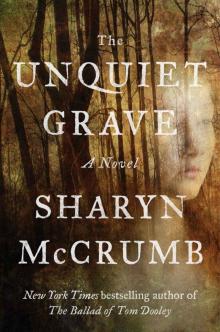 The Unquiet Grave: A Novel
The Unquiet Grave: A Novel The PMS Outlaws: An Elizabeth MacPherson Novel
The PMS Outlaws: An Elizabeth MacPherson Novel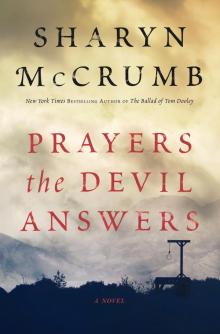 Prayers the Devil Answers
Prayers the Devil Answers Paying the Piper
Paying the Piper The Ballad of Tom Dooley: A Ballad Novel
The Ballad of Tom Dooley: A Ballad Novel Highland Laddie Gone
Highland Laddie Gone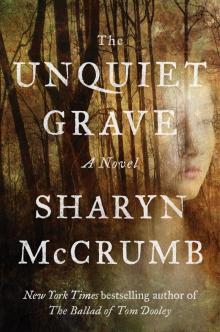 The Unquiet Grave
The Unquiet Grave The Devil Amongst the Lawyers
The Devil Amongst the Lawyers The Windsor Knot
The Windsor Knot The Hangman's Beautiful Daughter
The Hangman's Beautiful Daughter MacPherson's Lament
MacPherson's Lament The Ballad of Tom Dooley
The Ballad of Tom Dooley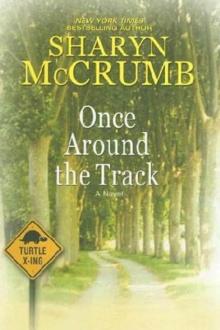 Once Around the Track
Once Around the Track St. Dale
St. Dale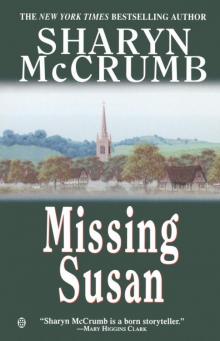 Elizabeth MacPherson 06 - Missing Susan
Elizabeth MacPherson 06 - Missing Susan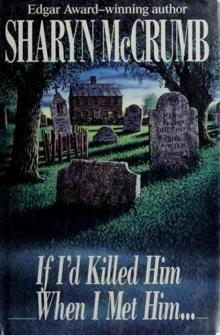 If I'd Killed Him When I Met Him…
If I'd Killed Him When I Met Him…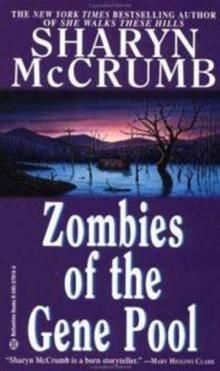 Zombies of the Gene Pool
Zombies of the Gene Pool Bimbos of the Death Sun
Bimbos of the Death Sun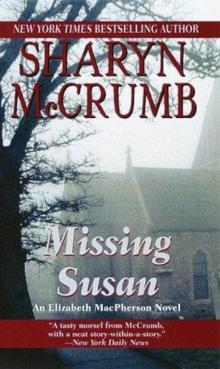 Missing Susan
Missing Susan Foggy Mountain Breakdown and Other Stories
Foggy Mountain Breakdown and Other Stories If I'd Killed Him When I Met Him
If I'd Killed Him When I Met Him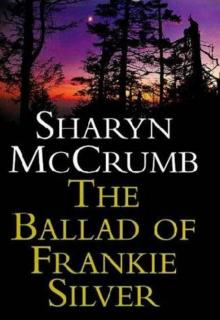 The Ballad of Frankie Silver
The Ballad of Frankie Silver Lovely In Her Bones
Lovely In Her Bones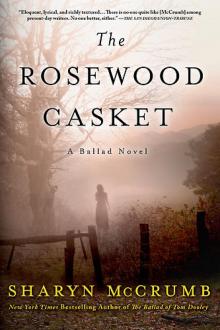 The Rosewood Casket
The Rosewood Casket King's Mountain
King's Mountain